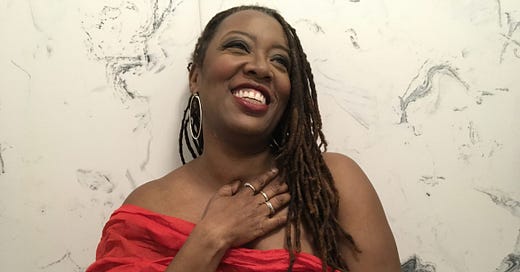Intimate conversations with our greatest heart-centered minds.
I first heard of Deesha Philyaw’s astonishing collection of short stories, The Secret Lives of Church Ladies, when Kiese Laymon posted about it on social media. He said something along the lines of: read this book because it’s about to change everything. And like many, when Kiese says to read something, I read it.
I’m so glad I did. These stories are smart, tender, probing, intimate, painful, lush, deep-sorrow, deep-joy celebrations and investigations of the lives of Black women and girls. Eula and Caroletta, childhood best friends, who meet each New Year’s Eve for a night of lovemaking and God dismantling. The barely-not-strangers who balance the grief of their dying mothers with the weighty pleasure of their very-much-alive bodies as they “rut around” in the car outside the hospice center. Olivia whose mother’s affair with the pastor ignites an earnest and thwarted yearning in her young heart for truth and freedom. Teenage Jael whose grandmother discovers her journals rife with longing for the pastor’s wife. And so many more.
Each of these characters is by necessity a warrior. Each has learned to forge their way in a world that is not always kind or welcoming to them. Each conjures different tools, different coping mechanisms, different guiding beliefs; each ebbs and flows to their own inner rhythm. And each in their own way creates intimacy and hope. Yes, they are often lonely, frustrated, even wronged. But they are not to be messed with and manifest the sort of entrenched beauty that, as Kiese pointed out, changes everything.
Deesha’s writing is crisp, clean, elegant. The stories are concise, some just a handful of pages, but hold layered, dynamic worlds. The level of humanity she’s able to convey is such few words is breathtaking. As is the humor. Sometimes sly. Sometimes overt, such as “Instructions for Married Christian Husbands” which guides married men through a successful affair. These stories remind us that everyone is living through something that’s dragging on them, even if they’re good at keeping it hidden.
Clearly, I’m not alone in my love of this book. The Secret Lives of Church Ladies won the 2021 PEN/Faulkner Award for Fiction, the 2020/2021 Story Prize, and the 2020 LA Times Book Prize: The Art Seidenbaum Award for First Fiction and was a finalist for the 2020 National Book Award for Fiction. It’s being developed for television by HBO Max with Tessa Thompson executive producing. Deesha is a Kimbilo Fiction Fellow and the 2022-2023 John and Renée Grisham Writer-in-Residence at the University of Mississippi. Her writing has appeared in Oxford American and Split Lip. She’s hard at work on two new books.
We chatted about oppression, the power of storytelling, and the necessity of justice to heal.
(Note: Next Thursday is Thanksgiving, so Beyond will be taking the day off. We’ll be back the following week with an interview with Esmé Weijun Wang.)
In your dedication you write: “And for everyone trying to get free.” What does being free mean to you?
Free means unburdened, unfragmented, unashamed, self-defining, and flourishing.
I love your acknowledgements. They’re a celebration of community. Can you share a bit about how this community came into being? And the importance of community both as a writer and as a human in today’s world?
Many of the folks in those acknowledgements are people I met online––in the blogging world and other digital literary communities, and on social media platforms like Facebook and Twitter. Even AOL groups from back in the day! Some are friends I made over the course of the last twenty-five years when I lived in Pittsburgh. I started seeking out local writers and kindred spirits, beginning in the early 2000s. Others are friends I met through my Kimbilio fellowship.
Some of my most treasured relationships are with people I’ve only actually met in person a handful of times. But we’ve shared the most important life moments, celebrations and mournings; losing and winning; devastation and delight; birthing and raising children; falling in and out of love; entering and leaving marriages; healing; making art. In 2005, I got divorced; my mother, father, and grandmother all died; and I decided to pursue freelance writing as a career. All in 2005. My community kept me alive, kept me going.





